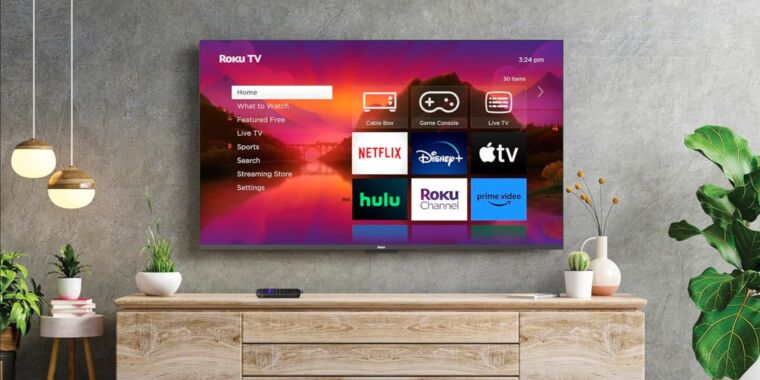- cross-posted to:
- technology@lemmy.world
- cross-posted to:
- technology@lemmy.world
A patent application from the company spotted by Lowpass describes a system for displaying ads over any device connected over HDMI, a list that could include cable boxes, game consoles, DVD or Blu-ray players, PCs, or even other video streaming devices. Roku filed for the patent in August 2023 and it was published in November 2023, though it hasn’t yet been granted.
The technology described would detect whether content was paused in multiple ways—if the video being displayed is static, if there’s no audio being played, if a pause symbol is shown anywhere on screen, or if (on a TV with HDMI-CEC enabled) a pause signal has been received from some passthrough remote control. The system would analyze the paused image and use metadata “to identify one or more objects” in the video frame, transmit that identification information to a network, and receive and display a “relevant ad” over top of whatever the paused content is.



If it’s patented, it can also be hacked more easily.
Why?
I think they’re erroneously stating that there will be so much technical information in the patent that it will be trivial to reverse engineer and remove from Roku products.
Unfortunately that isn’t the case.
Ahh you’re right that’s probably what they meant, but yeah in that case every patented software would be hacked
Well, the idea is that anything and everything can be hacked. It’s just that the difficulty varies wildly; some being trivial whereas others are impossible until someone finds an exploit. If you’re working with a total black box, you’ll have to make many assumptions, which means that figuring stuff out may take a while. If there’s at least some documentation, such as a patent, you won’t have to guess absolutely everything. That doesn’t guarantee that it’s going to be easy. Maybe the patent doesn’t go into much technical detail, but still manages to describe the product in just enough legal detail that the company can sue anyone trying to come too close.
It will be licensed to manufacturers with advertising incentives and packaged into consumer electronics.
Savvy electronics users will supply their own HDMI cables; this product will be for people who only understand enough to plug the ends between their box and the entertainment system.
Hell, you might even see these cables being handed out for “free”, akin to the AOL disc days.